

Slobbering Senators Woo Dimon While They Gut Dodd-Frank. I often get asked a Wall Street variation of the Ronald Reagan 1980 campaign saw, “Are you better off than you were four years ago?”
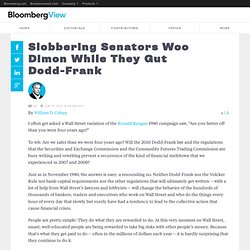
To wit: Are we safer than we were four years ago? Taming the Too-Big-to-Fails: Will DoddâFrank Be the Ticket or Is Lap-Band Surgery Required?, Nov. 15, 2011 - Richard Fisher Speeches - News & Events - FRB Dallas. (With Reference to Vinny Guadagnino, Andrew Haldane, Paul Volcker, John Milton, Tom Hoenig and Churchill’s ‘Terminological Inexactitude’ ) Remarks before Columbia University’s Politics and Business Club It is bracing to be with bright, young students here at the Politics and Business Club of Columbia University.
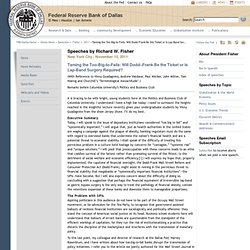
I understand I have a high bar today: I need to surmount the heights reached in the insightful lecture recently given your undergraduate students by Vinny Guadagnino from the show Jersey Shore. I’ll do my best. 070110_Dodd_Frank_Wall_Street_Reform_comprehensive_summary_Final.pdf. Paul Volcker Pushes for Reform, and Regrets His Past Silence. He left behind a group of legislators in Washington still trying to nail down a controversial attempt to overhaul the nation’s in the wake of the country’s most serious economic crisis since .

A well-regarded lion of the regulatory world, Mr. Volcker had endorsed the legislation before he went fishing, but unenthusiastically. If he were a teacher, and not a senior White House adviser and the towering former chairman of the , he says, he would have given the new rules just an ordinary B — not even a B-plus.
“There is a certain circularity in all this business,” he concedes. “You have a crisis, followed by some kind of reform, for better or worse, and things go well for a while, and then you have another crisis.” As the financial overhaul took final shape recently, he worked the phone from his Manhattan office and made periodic visits to Washington, trying to persuade members of Congress to make the legislation more far-reaching. Like few other policy giants of his generation, Mr. Mr. Mr. Financial Reform: Unfinished Business by Paul Volcker.
It should be clear that among the causes of the recent financial crisis was an unjustified faith in rational expectations, market efficiencies, and the techniques of modern finance.
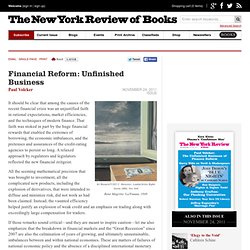
That faith was stoked in part by the huge financial rewards that enabled the extremes of borrowing, the economic imbalances, and the pretenses and assurances of the credit-rating agencies to persist so long. A relaxed approach by regulators and legislators reflected the new financial zeitgeist. All the seeming mathematical precision that was brought to investment, all the complicated new products, including the explosion of derivatives, that were intended to diffuse and minimize risk, did not work as had been claimed.
Instead, the vaunted efficiency helped justify an explosion of weak credit and an emphasis on trading along with exceedingly large compensation for traders. Take the most familiar and egregious case. Or consider the current European crisis. Where do we stand? How Wall Street Killed Financial Reform. From Dodd-Frank to Dud: How Financial Reform May Be Going Wrong. Congressional Democrats went ahead and wrote the trading prohibition into Dodd-Frank, the sweeping overhaul of the nation's financial rules pushed through last July.
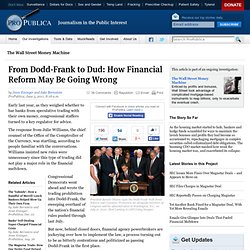
But now, behind closed doors, financial agency powerbrokers are jockeying over how to implement the law, a process turning out to be as bitterly contentious and politicized as passing Dodd-Frank in the first place. Government officials -- including Williams and the OCC -- are inserting exemptions as they formulate rules to enforce the law. Some regulators, facing severe budget constraints, caution that they may not be able to carry out some of its key provisions. Too Big to Fail Not Fixed, Despite Dodd-Frank: Simon Johnson. Here we go again.
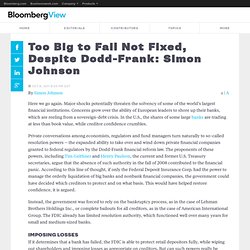
Major shocks potentially threaten the solvency of some of the world’s largest financial institutions. Concerns grow over the ability of European leaders to shore up their banks, which are reeling from a sovereign-debt crisis. In the U.S., the shares of some large banks are trading at less than book value, while creditor confidence crumbles. Private conversations among economists, regulators and fund managers turn naturally to so-called resolution powers -- the expanded ability to take over and wind down private financial companies granted to federal regulators by the Dodd-Frank financial reform law. The proponents of these powers, including Tim Geithner and Henry Paulson, the current and former U.S. Instead, the government was forced to rely on the bankruptcy process, as in the case of Lehman Brothers Holdings Inc., or complete bailouts for all creditors, as in the case of American International Group.
Imposing Losses Preemptive Use No Early Action Break Up Banks. The Political Economy of Dodd-Frank: Why Financial Reform Tends to be Frustrated and Systemic Risk Perpetuated by John Coffee. Columbia Law School; European Corporate Governance Institute (ECGI); American Academy of Arts & SciencesJanuary 9, 2012 Cornell Law Review, 2012 Columbia Law and Economics Working Paper No. 414 Abstract: Several commentators have argued that financial “reform” legislation enacted after a market crash is invariably flawed, results in “quack corporate governance” and “bubble laws,” and should be discouraged.
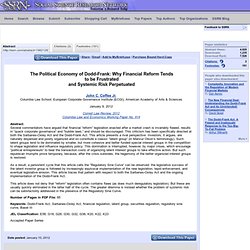
This criticism has been specifically directed at both the Sarbanes-Oxley Act and the Dodd-Frank Act. This article presents a rival perspective. As a result, a persistent cycle that this article calls the “Regulatory Sine Curve” can be observed: the legislative success of the latent investor group is followed by increasingly equivocal implementation of the new legislation, tepid enforcement, and eventual legislative erosion.
This article does not deny that “reform” legislation often contains flaws (as does much deregulatory legislation). Number of Pages in PDF File: 85 Suggested Citation.